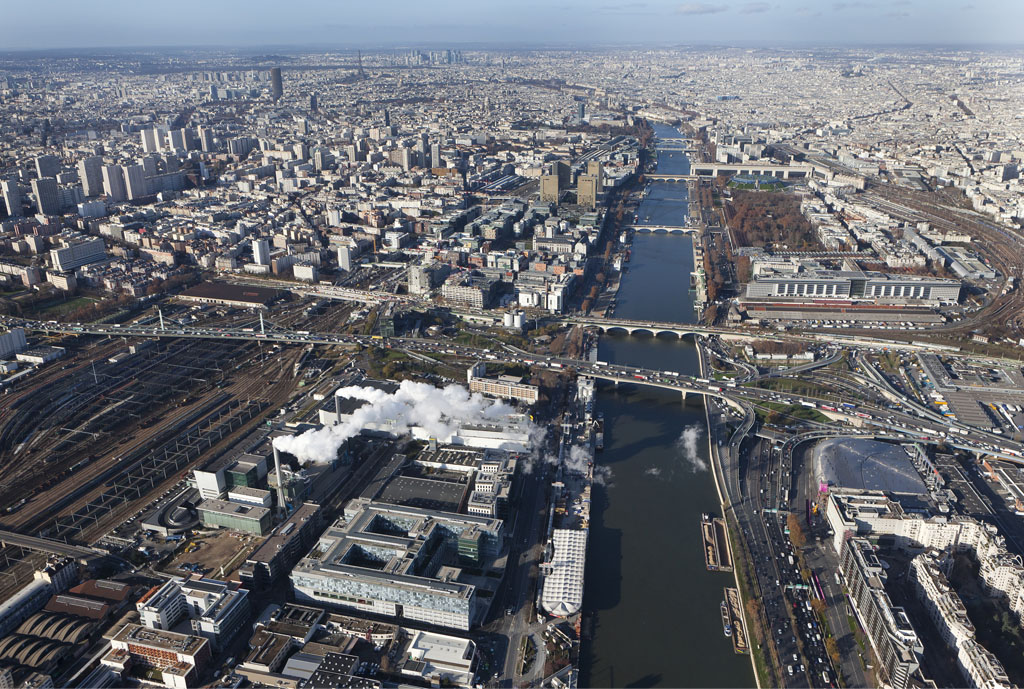06-02-15 // LIBERTÉ, DIGITALITÉ, CRÉATIVITÉ – INTERVIEW WITH JEAN-LOUIS MISSIKA

Aerial view of Ivry Bercy, ©City of Paris
Beatriz Ramo and Bernd Upmeyer, on behalf of MONU, spoke with the French sociologist Jean-Louis Missika. He is a member of the Council of Paris and assistant Mayor of Paris in charge of urban planning, architecture, projects of Greater Paris, economic development, and attractiveness. Since 1984 Missika has taught media sociology at the Institute of Political Studies in Paris and has published se-veral essays on the subject, particularly on the place of television in society. The interview took place on February 6, 2015 in his office in the City Hall of Paris.
Transnational Cities
Bernd Upmeyer: We would like to talk to you about a phenomenon that we call “Transnational Urbanism”. The motivation to dedicate an entire issue on that topic was born several years ago when we published an issue entitled “Border Urbanism”, which focused on urban phenomena that appear in cities that are located close to nation-state borders. And with this new issue of MONU we would like to expand on the topic of “Border Urbanism” through the topic of “Transnational Urbanism” as cross-border processes are not just limited to cities that are located close to nation-state borders, but impact cities anywhere else as well through trans-border relations. That is why we wanted to investigate how trans-border and transnational relations between individuals, such as people from Paris, Moscow or Rome, groups, firms or institutions have consequences for cities and create transnational urban landscapes and transnational urban lifestyles.
Jean-Louis Missika: And you have also the transfrontier, transborder cities like Basel, which has a governing body consisting of French, German, and Swiss people. A study once showed that in 2040 there will be more than 30 Global Cities that will be in-between two or three nation-states, mainly in Africa, some in Asia. In Africa you can have, for example, a conurbation of 70 million people connected through four different nation-states. This is interesting, because, as I state very often, the Global Cities, the World Cities and the nation-states are developing in very different ways. While the nation-state is declining – not the concept, but the reality of the nation-state – the World City is growing. And there will be some big difficulties in the future between nation-states and Global Cities as well. You already have some problems, for example, between New York and the United States. In Paris it is different, because the state is in a relationship with Paris that is based on the assumption that Paris and France is the same thing, which is actually not true. And in Great Britain, the United Kingdom, it is different too. There, the nation-state is at the service, and is a servant of the city of London. So, the relationship there is totally reversed.
Beatriz Ramo: In some of your recent interviews and texts you talk a lot about the opening of Paris and “Grand Paris” to the world, making Paris a very attractive city that welcomes investment, entrepreneurs, artists, researchers to settle in Paris, and also to participate in, and to contribute to, the richness of the city. All of this will generate more transnational lifestyles in the city. We would like to analyze, together with you, what impact this will have on Paris. If we call these transnational lifestyles in the city “software”, what would be, in your opinion, the “hardware” of the city that is needed for those lifestyles, in terms of, for example, infrastructure, urban logistics, etc., that is probably different from the hardware that is needed for people that do not live transnational lives in Paris? How can the city prepare itself for these changes?
JLM: You have given the answer already, because, in fact, Paris is in that sense like all the World Cities, I mean all the World Cities that are truly World Cities, like a seismograph of all the conflicts of the planet…
…the complete interview was published in MONU #22 on the topic of Transnational Urbanism on April 24, 2015.
Title: Liberté, Digitalité, Créativité
Project: Interview with Jean-Louis Missika
Date: February 2015
Type: Commissioned interview
Topic: Transnational Urbanism
Organizer: MONU
Status: Published
Publications: MONU #22, P. 6-13
Interviewer: Beatriz Ramo, Bernd Upmeyer